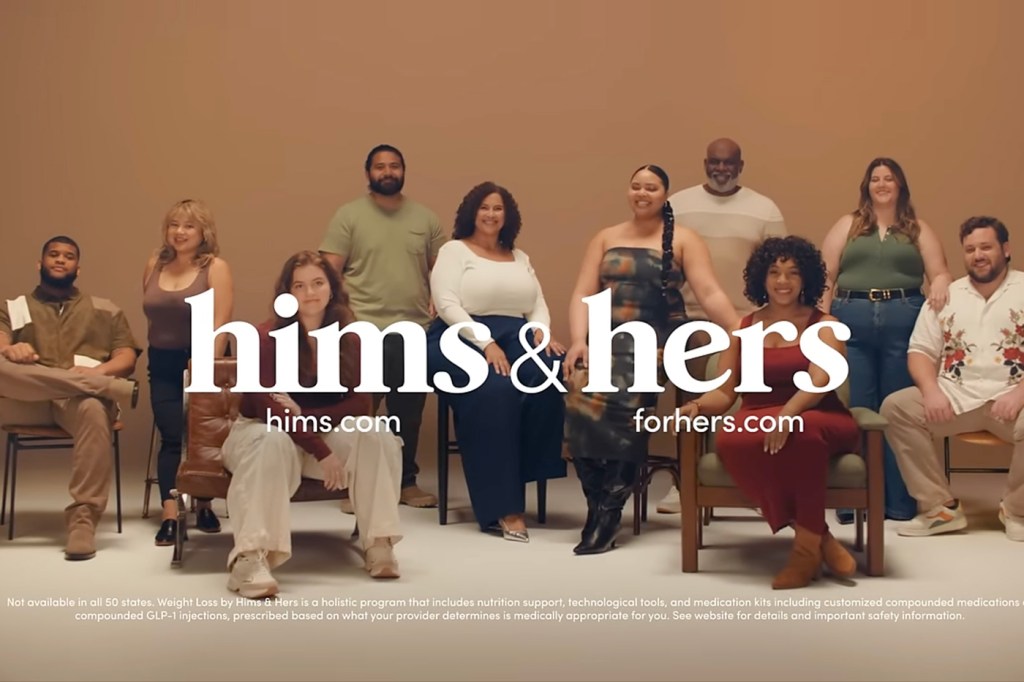Hims & Hers Super Bowl ad for new weight loss drugs faces backlash from health experts
“The lack of transparency around their labeling and description of what’s in their products is of concern,” says Elizabeth Glowacki, an assistant teaching professor at Northeastern University.

The Super Bowl ad featuring a new set of weight loss drugs raised more than a few eyebrows among members of the public health community — not least because the products aren’t approved by the Food and Drug Administration.
Telehealth startup Hims & Hers is promoting its latest addition to a suite of health care and lifestyle products: a compounded version of popular weight loss drugs Wegovy and Ozempic. The company is marketing the product as a cheaper alternative to the pair of drugs, which are currently in short supply.
In the process, the company slams what it says is a “broken” health care system designed to keep patients “sick and stuck.”
The ad prompted backlash from experts, advocates and politicians, who pointed to its deceptive marketing tactics — chiefly, that it is devoid of any side effects, risks or safety information typically disclosed by pharmaceutical companies as required by law.
Elizabeth Glowacki, an assistant teaching professor at Northeastern University, who focuses on health communication, message design, persuasion and mobile health, echoes much of that criticism. She says the ad also creates the impression that patients don’t need to consult with a health care professional when making decisions about products effectively designed as medications.
“They make it seem as though you can kind of take all of this into your own hands without any supervision, and that can have some very harmful consequences,” Glowacki says. “Especially because so many people are on all kinds of different medications, and there’s no discussion of the potential interaction effects here.”

The ad begins with a barrage of statistics centered around obesity and obesity-related deaths in the U.S. Proclamations about the “broken” health care system repeat throughout.
Marketing experts refer to this framing as “fear appeal” advertising.
About midway through the ad, products begin to appear: a green pill, a small vial emblazoned with the company name. In addition to the emotion-based framing, Glowacki says part of the deception lies in the presentation of “aesthetically pleasing” products. There is research, for example, showing that consumers think that products presented in a green label are “healthier than they really are,” she says.
“The lack of transparency around their labeling and their description of what’s in their products is of concern,” Glowacki says.
The company defended itself by suggesting, among other things, that its critics are complicit in the broader system failures: “This is a clear attempt by industry groups to cancel an advertisement that directly calls out how they are part of a system that fails to prioritize the health of Americans.”
Featured Posts
It has previously acknowledged that its products are not approved by federal health regulators. Pharmaceutical advertisements deploy many of the same tactics, but are nevertheless required to disclose additional health information, Glowacki says.
“There are a lot of issues with direct-to-consumer advertising, but at least with those you still have to see your doctor before getting a prescription,” she says. “Whereas with this new form of marketing, it’s not always made as clear; and I think people might put a lot of trust in these labels.”
She continues: “So my concern is that it’s easier for consumers to get their hands on these products without having any kind of discussion with their care provider. Although the direct-to-consumer ads go through a lot of the adverse side effects for consequences very quickly, at least they are listed there.
The ad comes amid a broader antiestablishment shift in public health with the appointment of Robert F. Kennedy Jr. to Health and Human Services Secretary. Kennedy’s views have been described as anti-vaccine and fiercely critical of Big Pharma and many existing FDA protocols.
“I think [the ad] is both trying to align itself with those objectives while also profiting off of attempts to promote inclusivity,” Glowacki says.
“On the one hand, it’s good to encourage conversation around some of these more stigmatized issues, such as mental health,” Glowacki says. “But I don’t think that the way they’re going about this is completely above board. I think it’s a bit careless and harmful.”
For consumers interested in Wegovy and Ozempic knock-offs, Glowacki recommends consulting with a health professional before they make a purchase.
“Still talk to your doctor,” she says. “And, with any product, really scrutinize the ingredients.”










